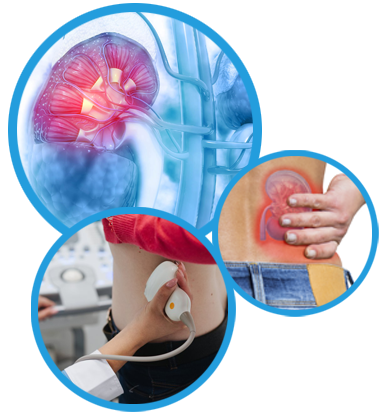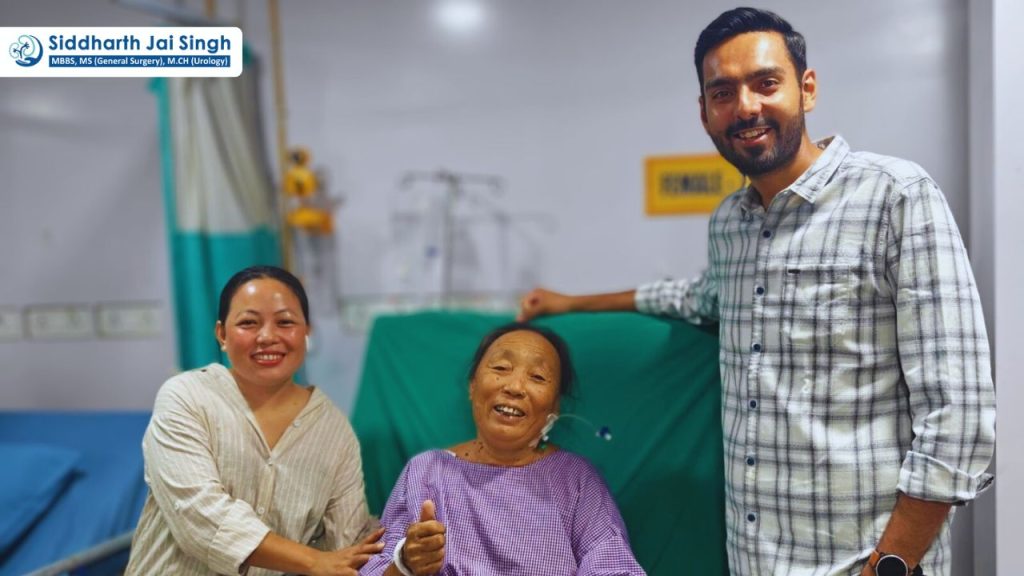
What is Renal Cancer?
Renal cancer, also known as kidney cancer, is a type of cancer that originates in the kidneys.
It typically develops in the renal tubules, which are small tubes within the kidneys responsible for filtering waste from the blood to produce urine.
Renal cancer can occur in one or both kidneys and may spread to other parts of the body if left untreated.
It typically develops in the renal tubules, which are small tubes within the kidneys responsible for filtering waste from the blood to produce urine.
Renal cancer can occur in one or both kidneys and may spread to other parts of the body if left untreated.
Symptoms and Causes
What are the signs of kidney cancer?
Symptoms of renal cancer may include:
- Blood in the urine (hematuria)
- Persistent pain in the side or lower back
- A mass or lump in the abdomen
- Fatigue
- Unintended weight loss
- Fever, Anemia, High blood pressure (hypertension)
- Swelling in the legs or ankles
What is the primary cause of kidney cancer?
– The exact cause of renal cancer is often unknown, but certain risk factors may increase the likelihood of developing the disease.
– Risk factors for renal cancer include smoking, obesity, high blood pressure, family history of kidney cancer, and certain genetic conditions such as von Hippel-Lindau disease or hereditary papillary renal cell carcinoma.
– Exposure to certain chemicals or environmental toxins, such as asbestos or cadmium, may also increase the risk of developing renal cancer.
– Risk factors for renal cancer include smoking, obesity, high blood pressure, family history of kidney cancer, and certain genetic conditions such as von Hippel-Lindau disease or hereditary papillary renal cell carcinoma.
– Exposure to certain chemicals or environmental toxins, such as asbestos or cadmium, may also increase the risk of developing renal cancer.

Diagnosis and Treatment in Siliguri
How is kidney cancer diagnosed?
– Diagnosis of renal cancer typically involves a combination of imaging tests, laboratory tests, and sometimes a biopsy.
– Common imaging tests used to diagnose renal cancer include ultrasound, computed tomography (CT) scan, magnetic resonance imaging (MRI), and positron emission tomography (PET) scan.
– A biopsy may be performed to obtain a tissue sample from the kidney for examination under a microscope to confirm the presence of cancerous cells.
– Common imaging tests used to diagnose renal cancer include ultrasound, computed tomography (CT) scan, magnetic resonance imaging (MRI), and positron emission tomography (PET) scan.
– A biopsy may be performed to obtain a tissue sample from the kidney for examination under a microscope to confirm the presence of cancerous cells.
How is kidney cancer treated?
– Renal cancer is a serious condition that requires prompt diagnosis and treatment.
– Treatment options for renal cancer may include surgery, radiation therapy, chemotherapy, targeted therapy, immunotherapy, or a combination of these approaches.
– The prognosis for renal cancer varies depending on factors such as the stage of the cancer, the patient’s overall health, and the effectiveness of treatment.
– Early detection and intervention can improve outcomes for individuals with renal cancer, highlighting the importance of regular screenings and awareness of symptoms.
– Support from healthcare providers, family, and friends can play a crucial role in navigating the challenges associated with a diagnosis of renal cancer.
– Treatment options for renal cancer may include surgery, radiation therapy, chemotherapy, targeted therapy, immunotherapy, or a combination of these approaches.
– The prognosis for renal cancer varies depending on factors such as the stage of the cancer, the patient’s overall health, and the effectiveness of treatment.
– Early detection and intervention can improve outcomes for individuals with renal cancer, highlighting the importance of regular screenings and awareness of symptoms.
– Support from healthcare providers, family, and friends can play a crucial role in navigating the challenges associated with a diagnosis of renal cancer.
Dr. Siddharth Jai SIngh
MBBS, MS (General Surgery), MCh (Urology)
Urology & Uro-Oncology
10+ Years of Experience
Satisfied Patients
0
K+
Surgeries Performed
0
+
Years of Experience
0
+
Current News & Event
Free Health camp
Lions Club Bhagalpur Gold invites you to a free health camp in which the focus will be on urological problems.
This camp will take place this Sunday, April 14, 2024 from 9 am to 1 pm.
This camp will take place this Sunday, April 14, 2024 from 9 am to 1 pm.

KIDNEY STONE, URINARY BLADDER STONE, URINARY TRACT INFECTION, LOW TESTOSTERONE, PROSTATE CANCER, KIDNEY CANCER, RENAL CYST.
KIDNEY STONE, URINARY BLADDER STONE, URINARY TRACT INFECTION, LOW TESTOSTERONE, PROSTATE CANCER, KIDNEY CANCER, RENAL CYST.






